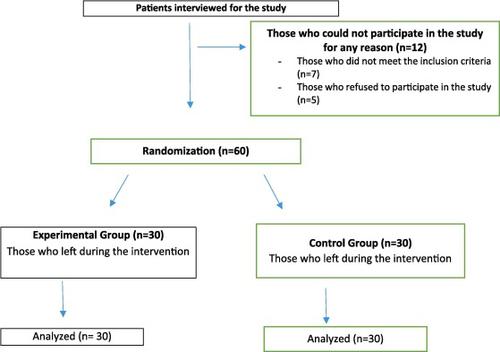当前位置:
X-MOL 学术
›
Epilepsy Behav.
›
论文详情
Our official English website, www.x-mol.net, welcomes your feedback! (Note: you will need to create a separate account there.)
The effects of web-based animation-supported progressive relaxation exercises applied to individuals with epilepsy on fatigue and sleep quality: A randomized controlled study
Epilepsy & Behavior ( IF 2.6 ) Pub Date : 2024-03-29 , DOI: 10.1016/j.yebeh.2024.109734 Neşe İşcan Ayyildiz , Nuray Bingöl
Epilepsy & Behavior ( IF 2.6 ) Pub Date : 2024-03-29 , DOI: 10.1016/j.yebeh.2024.109734 Neşe İşcan Ayyildiz , Nuray Bingöl

|
The study was conducted to determine the effects of Progressive Relaxation Exercise, supported by mobile-based animation, on fatigue and sleep quality of individuals with epilepsy. The study was conducted in a randomized controlled design with a pretest-posttest model on epileptic individuals who applied to Giresun University, Faculty of Medicine, Neurology Outpatient Clinic between February and December 2022. By using power analysis, the sample of the study was determined as 60 epilepsy patients (30 in the Control Group, 30 in the Experimental Group). The data were collected by face-to-face interview technique with the Personal Information Form, Pittsburgh Sleep Quality Index (PSQI), and Fatigue Severity Scale (FSS). Frequencies, percentages, arithmetic mean, standard deviations, Pearson Correlation Analysis, Paired -Test, Student’s -Test, and Chi-Square Test were used in the evaluation of the study data. When the Control Group’s mean scores in the pre-test and post-tests, which were performed with an interval of 6 weeks, were compared, a statistically significant difference was detected between the FSS and PSQI scores (p>0.05). The mean Fatigue Severity Scale score was found to be 5.24 ± 0.69 before the Progressive Relaxation Exercises and 3.82 ± 0.77 after the exercises. The mean scores of the individuals on the Fatigue Severity Scale after the relaxation exercises were found to be lower at a statistically significant level than the mean scores before the relaxation exercises (p<0.001). The differences between subjective sleep quality (p<0.001), sleep latency (p<0.001), daytime dysfunction (p<0.001), and total sleep quality (p<0.001) score averages after the Progressive Relaxation Exercises were statistically significant compared to the pre-exercises status. When the post-test scores of the participants in the Experimental Group was examined, significant, moderate, and positive differences were detected between the FSS and Total PSQI scores (r: 0.373-p: 0.042), Subjective Sleep Quality (r: 0.487-p: 0.006), which is one of the sub-dimensions of PSQI, Sleeping Pill Use (r: 0.531-p: 0.003), and Daytime Dysfunction (r: 0.461-p: 0.01) scores. It was determined that individuals with epilepsy experience fatigue and deterioration in sleep quality and there is a reciprocal relationship between the severity of fatigue and sleep quality in these individuals. Progressive Relaxation Exercises applied with the animation-supported web-based mobile intervention technique reduce the fatigue levels of individuals and increase sleep quality.
中文翻译:

基于网络的动画支持的渐进式放松练习应用于癫痫患者对疲劳和睡眠质量的影响:一项随机对照研究
该研究旨在确定由移动动画支持的渐进式放松运动对癫痫患者的疲劳和睡眠质量的影响。该研究采用随机对照设计,采用前测后测模型,针对 2022 年 2 月至 12 月期间申请吉雷松大学医学院神经内科门诊的癫痫个体。通过功效分析,研究样本确定为60名癫痫患者(对照组30名,实验组30名)。数据是通过面对面访谈技术、个人信息表、匹兹堡睡眠质量指数(PSQI)和疲劳严重程度量表(FSS)收集的。研究数据的评估使用了频率、百分比、算术平均值、标准差、皮尔逊相关分析、配对检验、学生检验和卡方检验。当比较对照组在间隔6周进行的前测和后测的平均分数时,发现FSS和PSQI分数之间存在统计学显着性差异(p>0.05)。渐进式放松练习前疲劳严重程度量表平均得分为 5.24 ± 0.69,练习后为 3.82 ± 0.77。发现放松练习后个体疲劳严重程度量表的平均分数低于放松练习前的平均分数,具有统计显着性水平(p<0.001)。渐进式放松练习后的主观睡眠质量 (p<0.001)、睡眠潜伏期 (p<0.001)、日间功能障碍 (p<0.001) 和总睡眠质量 (p<0.001) 评分平均值之间的差异具有统计学意义。练习前的状态。当检查实验组参与者的测试后分数时,发现 FSS 和 PSQI 总分(r:0.373-p:0.042)、主观睡眠质量(r:0.487- p: 0.006),它是 PSQI、安眠药使用 (r: 0.531-p: 0.003) 和日间功能障碍 (r: 0.461-p: 0.01) 分数的子维度之一。据确定,癫痫患者会感到疲劳和睡眠质量恶化,并且这些人的疲劳严重程度与睡眠质量之间存在相互关系。渐进式放松练习与动画支持的基于网络的移动干预技术相结合,可降低个人的疲劳程度并提高睡眠质量。
更新日期:2024-03-29
中文翻译:

基于网络的动画支持的渐进式放松练习应用于癫痫患者对疲劳和睡眠质量的影响:一项随机对照研究
该研究旨在确定由移动动画支持的渐进式放松运动对癫痫患者的疲劳和睡眠质量的影响。该研究采用随机对照设计,采用前测后测模型,针对 2022 年 2 月至 12 月期间申请吉雷松大学医学院神经内科门诊的癫痫个体。通过功效分析,研究样本确定为60名癫痫患者(对照组30名,实验组30名)。数据是通过面对面访谈技术、个人信息表、匹兹堡睡眠质量指数(PSQI)和疲劳严重程度量表(FSS)收集的。研究数据的评估使用了频率、百分比、算术平均值、标准差、皮尔逊相关分析、配对检验、学生检验和卡方检验。当比较对照组在间隔6周进行的前测和后测的平均分数时,发现FSS和PSQI分数之间存在统计学显着性差异(p>0.05)。渐进式放松练习前疲劳严重程度量表平均得分为 5.24 ± 0.69,练习后为 3.82 ± 0.77。发现放松练习后个体疲劳严重程度量表的平均分数低于放松练习前的平均分数,具有统计显着性水平(p<0.001)。渐进式放松练习后的主观睡眠质量 (p<0.001)、睡眠潜伏期 (p<0.001)、日间功能障碍 (p<0.001) 和总睡眠质量 (p<0.001) 评分平均值之间的差异具有统计学意义。练习前的状态。当检查实验组参与者的测试后分数时,发现 FSS 和 PSQI 总分(r:0.373-p:0.042)、主观睡眠质量(r:0.487- p: 0.006),它是 PSQI、安眠药使用 (r: 0.531-p: 0.003) 和日间功能障碍 (r: 0.461-p: 0.01) 分数的子维度之一。据确定,癫痫患者会感到疲劳和睡眠质量恶化,并且这些人的疲劳严重程度与睡眠质量之间存在相互关系。渐进式放松练习与动画支持的基于网络的移动干预技术相结合,可降低个人的疲劳程度并提高睡眠质量。



























 京公网安备 11010802027423号
京公网安备 11010802027423号